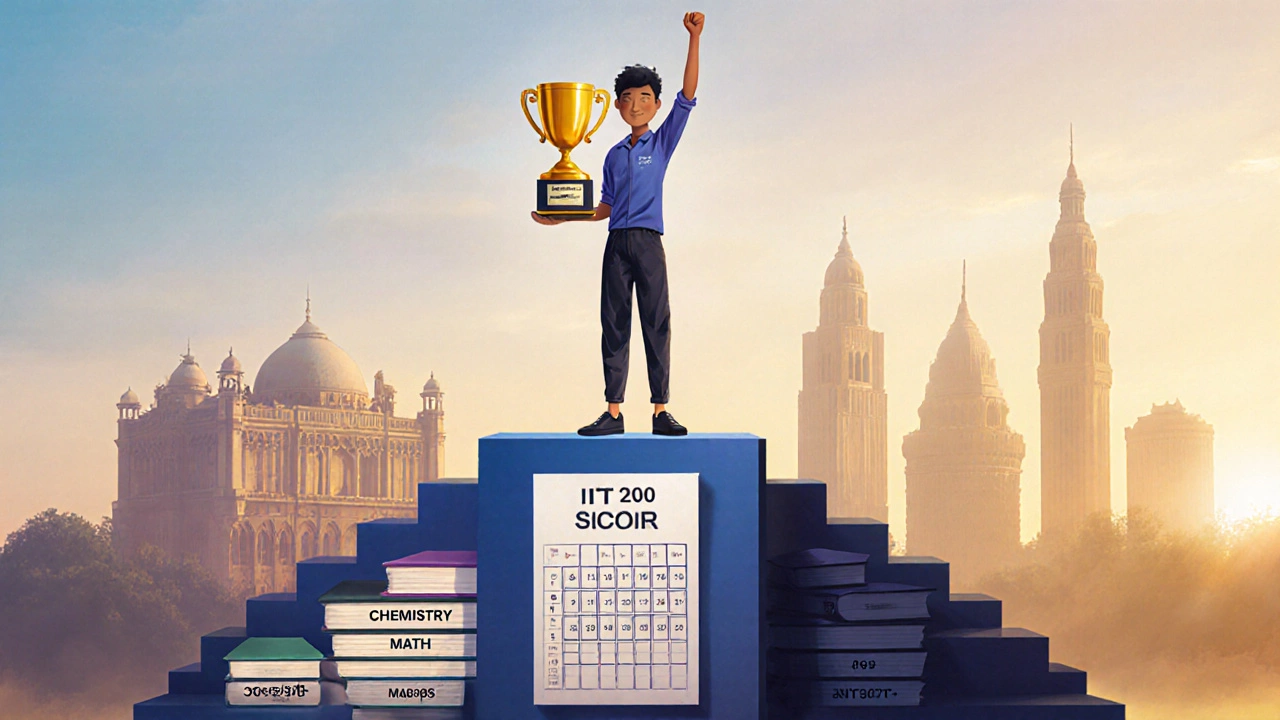JEE Subject Priority Calculator
Calculate Your JEE Rank Potential
Enter your expected scores to see how they might translate to your JEE Advanced rank and get personalized study recommendations based on the article's proven strategy.
Your Inputs
Key Insights
Results
Estimated Rank
Strength Analysis
If you're aiming for an IIT, you're not just picking a subject-you're picking your future. The question which subject is best for IIT isn’t about which one’s easiest. It’s about which one gives you the highest chance of cracking JEE Main and JEE Advanced with a rank that gets you into the top 10 IITs. And the answer isn’t a single subject. It’s a strategy built on three core subjects: Physics, Chemistry, and Mathematics.
Mathematics: The Engine of Your Score
Mathematics is the single biggest differentiator in JEE Advanced. In 2024, over 62% of candidates who scored above 200 in JEE Advanced had Mathematics as their strongest subject. Why? Because math problems are precise. Right or wrong. No partial credit in the final score. But here’s the catch: math is also the subject where you can build the most consistent momentum.
If you master calculus, coordinate geometry, algebra, and vectors-topics that make up nearly 50% of the math paper-you’re already ahead of 70% of aspirants. The questions don’t change much year to year. A 2024 JEE Advanced paper had a 10-mark question on definite integrals that was almost identical to a 2021 version. Practice past papers. Not just solving them-timing them, analyzing why you got one wrong, and redoing it until it’s automatic.
Students who treat math as a memorization subject fail. Those who treat it like a puzzle game win. Every problem has a pattern. Once you see it, you’ll spot it again.
Physics: Where Theory Meets Real World
Physics is where many students lose confidence. It’s not because it’s hard-it’s because it’s misunderstood. JEE Physics doesn’t test your ability to recite formulas. It tests whether you can visualize forces, energy flow, and motion in real time.
Take electrostatics. In 2023, the toughest question wasn’t about Coulomb’s law-it was about how a charged particle behaves when moving between two plates with different potentials. That’s not in your textbook. That’s application. You need to draw the field lines, predict the trajectory, and calculate the time of flight-all in under 90 seconds.
Focus on mechanics first. It’s the foundation. If you can solve problems involving pulleys, inclined planes, and circular motion without hesitation, you’ve already cracked 40% of JEE Physics. Then move to electromagnetism. Don’t skip modern physics-it’s easy marks. Nuclear decay, photoelectric effect, Bohr’s model-these questions are direct. Learn the formulas. Memorize the constants. And practice numericals daily.
Chemistry: The High-Scoring Secret
Chemistry is the quiet winner in JEE. It’s the subject where you can guarantee 80-90 out of 120 marks if you prepare right. And that’s the difference between a 5000 rank and a 1000 rank.
Inorganic Chemistry is pure memory. But not random memory. Learn the periodic trends. Memorize the exceptions-why is chromium’s configuration [Ar] 3d⁵ 4s¹ and not [Ar] 3d⁴ 4s²? Why does copper form Cu⁺ and not Cu²⁺ in some compounds? These aren’t tricks. They’re facts. Write them down. Revise them every morning.
Organic Chemistry is about reaction mechanisms. Stop memorizing reactions. Start drawing arrows. Understand why nucleophiles attack electrophiles. Why does SN2 prefer primary carbon? Why does elimination dominate with strong bases? Once you get the logic, you can predict 80% of reactions without seeing them before.
Physical Chemistry? It’s math in disguise. Thermodynamics, equilibrium, electrochemistry-these are formula-heavy. But the formulas are logical. If you understand the derivation, you won’t forget them. And if you practice 10 numericals a day, you’ll nail this section every time.

How to Prioritize: The Real Strategy
So which subject is best? The one you can score the most in. For most students, that’s Chemistry. But if you’re strong in math, you can carry the whole paper. Here’s how to build your priority list:
- Start with Chemistry-build your safety net. Aim for 85+ in this section.
- Then lock down Mathematics. You need 80+ here to be competitive.
- Use Physics to push you over the top. Don’t chase perfection. Aim for 70+.
This isn’t about equal effort. It’s about smart allocation. Spend 40% of your time on Chemistry, 40% on Math, and 20% on Physics-until you’re consistently scoring 200+ in mock tests. Then shift focus to your weakest area.
Many students waste months trying to become perfect in Physics. They end up with weak Chemistry and shaky Math. That’s how you get stuck at 150-170. The top scorers? They’re strong in two, solid in one.
What About Biology or Other Subjects?
If you’re asking this question, you might be confused by JEE Main and NEET. JEE is only for engineering. Biology doesn’t count. You don’t need it. If you’re studying biology alongside JEE, you’re spreading yourself too thin. You’ll end up mediocre in all three.
There’s no shortcut. No magic subject. No secret coaching trick. Success comes from consistent, targeted practice. One student from Patna scored 312 in JEE Advanced 2024. He didn’t study 16 hours a day. He studied 8 hours-but 6 of those were on Mathematics and Chemistry. He skipped Physics until the last 3 months. He didn’t skip it to avoid it-he skipped it to master the other two first.

Common Mistakes That Cost Ranks
Here’s what most students do wrong:
- Trying to learn everything. Focus on high-weightage topics. Skip rare derivations.
- Ignoring previous years’ papers. JEE repeats concepts. Not questions-concepts.
- Practicing only easy problems. You need to train for the hard ones. The ones that make others panic.
- Not timing mock tests. Real exam pressure isn’t about content-it’s about speed under stress.
- Comparing yourself to others. Your path is yours. Someone else’s 250 doesn’t mean you need 270. Just get your target rank.
Final Answer: What’s the Best Subject?
The best subject for IIT isn’t one subject. It’s the combination where you’re strongest and most consistent. For most, that’s Chemistry for scoring, Mathematics for ranking, and Physics for breaking the top 500.
If you’re starting now, build your foundation in Chemistry. Master the reactions. Learn the trends. Then move to Math-solve problems until they feel like breathing. Finally, use Physics to polish your score.
There’s no single subject that will get you into IIT. But if you master two of them-especially Math and Chemistry-you’ll be sitting in a lecture hall at IIT Bombay before you know it.
Is Chemistry the easiest subject to score high in JEE?
Yes, for most students, Chemistry is the easiest to score high in because it’s mostly factual and predictable. Inorganic Chemistry requires memorization, Organic Chemistry follows logical patterns, and Physical Chemistry uses clear formulas. With consistent practice, students can reliably score 85-95 out of 120 in this section, which is often the difference between a good rank and a top rank.
Can I skip Physics and still get into IIT?
You can’t skip Physics entirely, but you don’t need to be perfect in it. Many top rankers focus on Math and Chemistry first, then use the last 2-3 months to solidify Physics. Aim for 70+ out of 120 in Physics. That’s enough if you score 90+ in Math and 85+ in Chemistry. The key is balance, not perfection.
Should I focus more on JEE Main or JEE Advanced?
Start with JEE Main-it’s the gateway. But prepare for JEE Advanced from day one. The syllabus is almost the same, but Advanced tests deeper understanding and problem-solving speed. If you solve Advanced-level problems from the beginning, JEE Main will feel easier. Don’t treat them as separate exams.
Is it better to study all three subjects equally?
No. Equal effort rarely leads to top ranks. Top performers allocate time based on scoring potential. Most spend 40% of time on Math, 40% on Chemistry, and 20% on Physics. Adjust based on your strengths. If you’re weak in Math, shift more time there. The goal isn’t balance-it’s maximum score.
How many hours should I study daily for IIT JEE?
Quality matters more than quantity. 6-8 focused hours a day with no distractions beats 12 hours of half-hearted study. Include 2 hours of timed practice, 2 hours of revision, and 2 hours of doubt-solving. Rest and sleep are part of preparation. Burnout kills more aspirants than lack of study.





